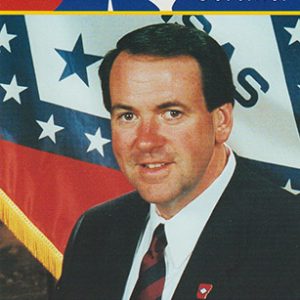calsfoundation@cals.org
Lake View School District No. 25 v. Huckabee
The court case Lake View School District No. 25 v. Huckabee examined the structure for the funding of Arkansas schools in a grueling, fifteen-year process. This case led to the subsequent overhaul of public school funding with the aim to be more fair and exact and to benefit all Arkansas students equally.
In 1992, the school district of Lake View (Phillips County) first brought its case against the State of Arkansas, claiming that the funding system for the public schools violated both the state’s constitution and the U.S. Constitution because it was inequitable and inadequate. At that time, schools received funding from three levels of government: local, state, and federal. Because some local governments had more tax money available for spending, school districts in more affluent areas received considerably larger local contributions. Though the state and federal contributions were designed to balance the local governments’ contributions, they often failed to do so, thus leaving some school districts with insufficient and inequitable funds.
In 1994, Chancery Court Judge Annabelle Imber ruled in favor of the Lake View School District and declared Arkansas’s funding system for education to be unconstitutional. She allowed the state two years to come into compliance with the ruling. In 1995, Arkansas passed three acts designed to improve school funding. Collectively, Acts 916, 917, and 1194 raised taxes for those in lower-income school districts, created a committee to investigate the adequacy of school funding, and created grants and other financial aid for suffering school districts. Furthermore, in 1997, Amendment 74 to the state constitution passed and allocated a specific portion of property taxes to be reserved solely for public schools.
Despite these legislative changes, the Lake View School District remained unsatisfied and filed five amended complaints against the state, asserting that the remedies were insufficient and unconstitutional. In return, the state filed numerous appeals that kept the case tied up in court without resolution. In 1998, the chancery court attempted to put the matter to rest by formally upholding the constitutionality of the 1995 acts as well as limiting the Lake View School District’s time frame for putting forth further amended complaints. However, Lake View appealed to the Arkansas Supreme Court, citing the chancery court’s decision as too cursory. The higher court agreed.
In 2002, the Arkansas Supreme Court held a compliance hearing and maintained that the state had failed to rectify the constitutional problems with the school funding programs and put into effect a compliance deadline of January 1, 2004. In response, the Arkansas General Assembly passed several pieces of legislation designed to create a more equitable and adequate educational system. Governor Mike Huckabee also worked toward that goal by implementing a system of consolidation for the schools. The consolidation plan called for the closing or merging of the state’s smaller schools so that the state would have fewer schools among which to divide its money. However, several activist groups, including Save Our Schools and the Arkansas Rural Education Association, fought to keep the smaller schools open by asserting that these schools provided students with unique benefits and were therefore valuable to the state. As a compromise, the consolidation plan was applied only to the smallest school districts, or those with fewer than 350 students.
When the January 1, 2004, deadline arrived, the Arkansas Supreme Court assigned two special masters, David Newbern and Bradley Jesson, to determine whether Arkansas’s educational system was in compliance with the constitution. The masters’ report indicated that the Arkansas General Assembly and Governor Huckabee had made considerable improvements and that the issues brought up by the court had been addressed. Therefore, on June 18, 2004, the Arkansas Supreme Court closed the case and released its jurisdiction over the legislature. However, in 2005, the smaller school districts brought further accusations against the constitutionality of the educational system, and the Lake View case was once again before the Arkansas Supreme Court. The Court examined the legislation for the 2005–06 school year and found that the system was still unconstitutional because the legislative reforms were not being properly implemented. Upon this decision, the court reassigned the two masters to the project and set a deadline of December 2006 for full compliance.
In April 2006, the Arkansas General Assembly passed legislation that gave the public schools additional funding, and the special masters’ final report in 2007 was once again positive, leading the court to declare the funding program for education to be constitutional. Through a final series of reforms, the Lake View School District was consolidated with the Barton-Lexa School District. Though the case had then been active for fifteen years, the long process had—at least to the satisfaction of the special masters—brought the state’s public schools up to the standards dictated by the state constitution.
On November 29, 2012, the Arkansas Supreme Court ruled in a 4-3 split decision that school districts can keep property tax revenue even if it exceeds funding levels required by law. This decision may have significant effects on the equitable funding of education in Arkansas that the Lake View case had sought to address.
For additional information:
Brantley, Max. “It’s Now or Never.” Arkansas Times, June 16, 2005, p. 16.
———. “Lake View Drags On.” Arkansas Times, November 30, 2006. Online at http://www.arktimes.com/ArkansasBlog/archives/2006/11/30/lake-view-drags-on (accessed February 7, 2022).
Lake View School Dist. No. 25 v. Huckabee, 351 Ark 31, 91 SW3d 472 [2002].
Lake View School District No. 25 v. Huckabee (Lake View 2004), 189 S.W.3d 1 (Ark. 2004).
Searight, Patricia A. “Lake View Litigation, Arkansas’ Education Funding Policy, and Adequacy: A Conflict between Individual Need and Collective Resource.” PhD diss., University of Central Arkansas, 2016.
Laura Choate
Conway, Arkansas
 Brown, Robert Laidlaw (Bob)
Brown, Robert Laidlaw (Bob) Divergent Prosperity and the Arc of Reform, 1968–2022
Divergent Prosperity and the Arc of Reform, 1968–2022 Education Reform
Education Reform Jim DuPree v. Alma School District No. 30
Jim DuPree v. Alma School District No. 30 Huckabee Campaign
Huckabee Campaign 




Comments
No comments on this entry yet.